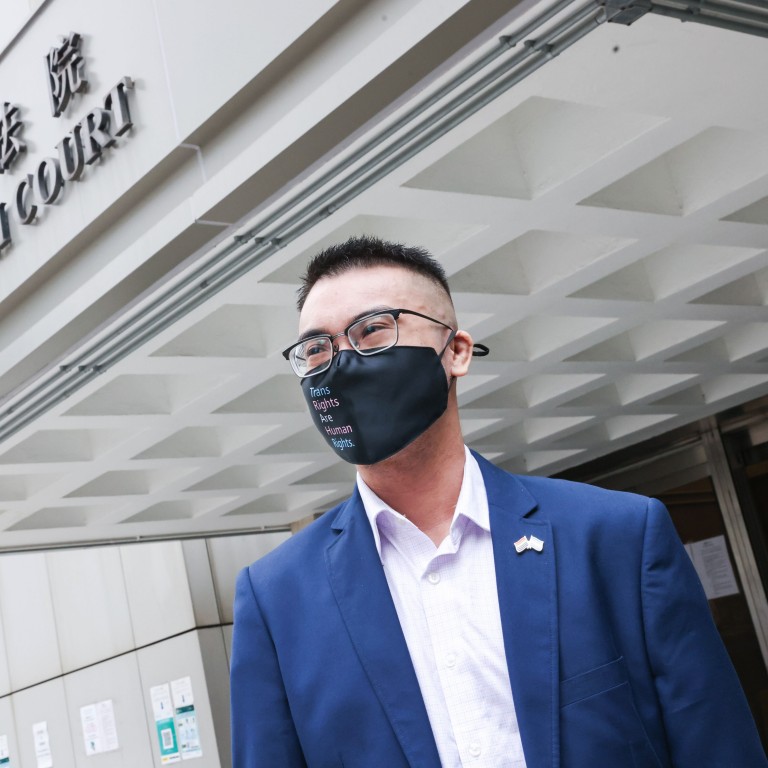
Hong Kong appeal court rules against transgender pair who tried to amend status on their identity cards
- Henry Edward Tse and a person identified only as Q had applied for judicial review of government’s refusal to amend ID cards but failed at Court of First Instance in 2019
- Commissioner of registration will only amend gender entry on ID card if holder has had full sex reassignment surgery unless applicant has medical proof operation cannot be done
A court has upheld the constitutionality of a controversial policy that limits gender status changes on Hong Kong identity cards to those who have undergone sex reassignment surgery.
The Court of Appeal on Wednesday ruled against Henry Edward Tse and a person identified only as Q after they had applied for a judicial review of the government’s refusal to amend their identity cards but failed at the lower Court of First Instance in 2019.
The government welcomed the ruling, while the appellants have called it a disappointing setback, with Tse vowing to appeal to the city’s top court.
“I am confident that this offensive policy will be overturned in the end,” Q added.
Under the existing policy, the commissioner of registration will only amend the gender entry on the ID card if the holder has had full sex reassignment surgery, unless there is medical proof the person cannot undergo the operation.
However, the entry is simply an identifier of the card holder under a binary system of male or female, and does not confer any legal status or recognition of the person’s gender.
In Hong Kong, there is currently no legislation providing for the recognition of the reassigned, acquired or preferred gender of a person for all legal purposes.
Has Hong Kong made progress on policy and law for LGBT community?
The appellants had their breasts removed, received hormonal treatment and lived full-time as men, but retained their uteruses and ovaries and decided against undergoing surgery to construct genitals of the opposite sex, as they found the invasive treatment cruel and unnecessary. Both of them have since been issued British passports stating their gender as male.
Their counsel, Dinah Rose QC, had argued that the policy requirement was unconstitutional and discriminatory, adding that the surgery was not “the only workable model”, as described by the lower court, for registration officers to determine applications for amending the gender identifier, as could be seen in the United States, Britain, Austria, South Korea and Singapore.
Tse was issued a Gender Recognition Certificate in the UK in 2016. But in Hong Kong, he faced routine humiliation from bank tellers, service providers and law enforcement officers, while also choosing to avoid public toilets and changing facilities for fear of being stopped and questioned, the court heard.
Speaking to the Post, Tse said that a bank employee had refused to believe him after noticing his personal documents listed him as female.
“I was given two choices: either I experience this chronic torture on a day-to-day basis or acute physical torture on my body,” Tse said, referring to the unfriendly scrutiny he had faced over his gender and the sex reassignment procedure.
At the hearing, the government countered that the commissioner had to balance transgender rights against the difficulties faced by both the public and service providers, who would experience distress and confusion if there was incongruence between the gender entry on the identity card and the person’s physical appearance.
In a 64-page judgment, the three appeal judges said they were “profoundly conscious of the hardship” faced by the appellants, but also found that their predicament “only arises on a need basis” whenever they presented their identity cards.
Their embarrassment and distress could be reduced if the two used their British passports, where possible, the judges said.
Three-quarters of Hong Kong transgender people have considered suicide: survey
The judges also found that the lower court was right in dismissing allegations of discrimination and infringements of the appellants’ right to privacy and not to be subjected to cruel, inhuman or degrading treatment.
“The policy is justified as a matter of law,” Mr Justice Jeremy Poon Shiu-chor, the chief judge of the High Court, wrote in giving the judgment of the bench, which also included Court of Appeal vice-president Madam Justice Susan Kwan Shuk-hing and Mr Justice Aarif Barma.
Poon said the effective registration of the population relied on the correctness of individuals’ personal details and a full surgery was the “most objective and definite” yardstick that registration officers could apply in any given application, in the absence of legislation specifying the extent of the change required.
Short of a full surgery, the court agreed with the commissioner that there was a risk of reversibility that could create difficult implications, such as when a female-to-male transgender person stops hormonal treatment after changing their identity card, recovers fertility and gives birth.
“Gender identity involves more than the private interests of an individual,” Poon continued. “Bearing in mind how identity cards are used in Hong Kong, the commissioner is entitled to take into account the practical difficulties … in formulating the policy.”
Additional reporting by Chris Lau

